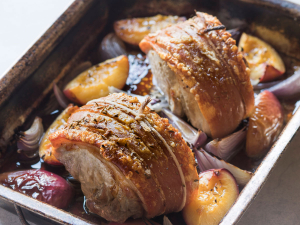Editorial: Happy days
OPINION: The year has started positively for New Zealand dairy farmers and things are likely to get better.
 Scientists at AgResearch are examining how factors like gender and pH values impact the eating quality of pork.
Scientists at AgResearch are examining how factors like gender and pH values impact the eating quality of pork.
Researchers are investigating what makes great-tasting pork as part of an innovative eating quality project.
Scientists at AgResearch are examining how factors like gender and pH values impact the eating quality of pork.
Consumer testing will help the researchers evaluate attributes such as aroma, tenderness, juiciness, flavour, overall perception of quality, and how likely they would be to purchase the pork.
The New Zealand pork industry aims to use the findings of the study to develop a quality mark for pork so Kiwis can be confident they’ll have a consistently excellent eating experience every time.
The research is a collaboration between NZPork and the Ministry for Primary Industries (MPI), through its Sustainable Food and Fibre Futures fund.
NZPork is contributing $59,875 to the research project with MPI’s Sustainable Food and Fibre Futures fund investing $45,000 and FreshPork $4,648.
AgResearch senior scientist Carolina Realini says she and her colleagues will focus on consumer sensory testing with pork loin from different genders and at different pH levels.
“We’ll draw on the eating experiences of a group of consumers to gain insights into what they perceive from different treatments. The findings of this consumer study will then lead to independent written findings that can be drawn on by the industry.”
NZPork chief executive Brent Kleiss says although New Zealand born and raised pork is of a high quality from an environmental and animal welfare perspective, there is no verifiable programme to measure eating quality.
“The findings will give us valuable information and insights about just how much pig gender and pH factors enhance or lessen the eating experience. This is about the industry ensuring Kiwis can be confident about the quality of New Zealand born and raised pork.”
“Pork is one of the most popular proteins in the world, but some people still believe all pork is a fatty meat. However, most cuts of pork are quite lean when the external fat (which is easy to remove) is cut off, the same as you might do for other meats,” says Kleiss.
Steve Penno, MPI’s director of investment programmes, says the knowledge about developing a consistently high-quality product will be an especially valuable part of the project.
“Better understanding of what leads to pork with attributes consumers enjoy most will help farmers raise a premium homegrown product.”
The research is expected to be completed early next year.
The World Wide Sires National All Day Breeds Best Youth Camp Best All Rounder plaudit has become family affair, with 2026 Paramount Cup winner Holly Williams following in her sister Zara's footsteps.
DairyNZ is giving New Zealand farmers a unique opportunity to gain hands-on governance and leadership experience within the dairy sector.
Herd improvement company LIC has posted a 5.2% lift in half-year revenue, thanks to increasing demand for genetics.
According to the latest Fresh Produce Trend Report from United Fresh, 2026 will be a year where fruit and vegetables are shaped by cost pressures, rapid digital adoption, and a renewed focus on wellbeing at home.
The Roar is a highlight of the game hunting calendar in New Zealand, with thousands of hunters set to head for the hills to hunt male stags during March and April.
OPINION: The past few weeks have been tough on farms across the North Island: floods and storms have caused damage and disruption to families and businesses.

OPINION: Meanwhile, red blooded Northland politician Matua Shane Jones has provided one of the most telling quotes of the year…
OPINION: This old mutt has been around for a few years now and it seems these ‘once in 100-year’ weather…